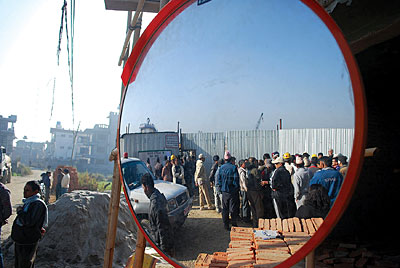 MAKAR SHRESTHA |
Good things never seem to last long, especially in Nepal. Just as the Beed was noting how quickly road construction has progressed during a drive to Dhulikhel on Sunday, he came by a gang of residents obstructing construction work. It's another example of might translating into right in Nepal. During the Panchayat era, people advertised their connections to the palace by showing off their electricity and water connections. So what's the point of having laws governing how construction contractors behave? We have never been tuned to respecting what the law actually says: people do whatever they think the law means.
Law in Nepal is just a suggestion: red lights have become a suggestion to stop and 'No Parking' signs are put up to prove that what is written in the driving lesson book is not false. If one watches an altercation between microbus or cab drivers and a cop in the streets, it takes a while to figure out who is trying to book whom. Of late it is becoming more and more difficult to understand who is trying to enforce the law and who is trying to break it.
These issues are starting to affect all sectors. Let's take the Beed's Chartered Accountant fraternity. Suddenly, the Institute of Chartered Accountants (ICAN) decided that it would take action against auditors empanelled with Nepal Rastra Bank (NRB) without ICAN's approval. Auditors doing audits of banks and financial institutions have to get themselves enlisted with NRB as per the Bank and Financial Institutions Act. But ICAN insisted it, and not NRB, had to determine who would be listed. How can one bunch of people tell the other bunch that you cannot follow the law, and we make our own laws?
The politics of organisations plays its own role in such shenanigans whereby laws are rewritten or broken. For instance, how many auditors that ICAN has legally taken action against have been disqualified over the past decade? ICAN's leadership needs the votes of its members, so ultimately, it will not go too hard on them, just as politicians are incapable of making unpopular decisions. Look at how much tax is being paid by the leaders of various apex bodies. Do they represent the firms that actually pay huge amounts of tax? What does the law mean to them?
The way our laws are written is far from ideal, based as it is on the advice of parachute consultants from abroad. Therefore we have a tax law that can never be accurately translated into English or we have a new Banks and Financial Institution Act. Those who failed in government become consultants to bilateral and multilaterals and write laws that are sure to fail during implementation.
Rule of law is as important to getting things going in the country as is the constitution-building process. Yet implementation and enforcement of the rule of law doesn't offer as many perks as many useless programs do. The cracks are growing wider and the list of deprived people is getting longer. Private armies and private laws have never been an option. Government should remember that we pay tax to ensure that it provides law and order. Please wake up!



